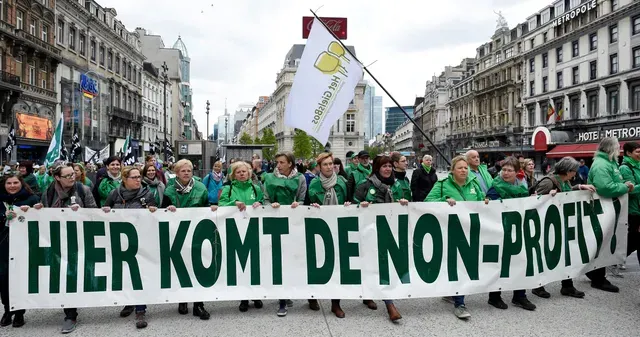For the second time this year, the non-profit sector is demonstrating in Brussels. The unions expect between 10,000 and 20,000 demonstrators on Tuesday who demand quick measures to tackle, among other things, staff shortages in the sector.
The sector, which includes hospitals, residential care centers, home nursing, childcare, youth care and customization companies, came out on the street at the end of January. The competent ministers showed understanding at the time, but “they also made it clear to us that there was no willingness to release resources”, according to the socialist trade union BBTK. That willingness would only be there after the elections in mid-2024, says the union.
“But we can’t wait until after the elections,” says Olivier Remy, general coordinator of the Christian trade union ACV Puls. “We ask the various governments to take additional measures in the short term. After the elections, work must be done on a future plan for the longer term.”
The liberal trade union also finds waiting “unacceptable”. “The personnel problems are huge,” says Gert Van Hees of ACLVB.
Close departments
The outflow of employees is increasing and the influx cannot follow, the unions say. There are absence rates of up to 15 percent, which further increases the workload on employees. In recent weeks, for example, there have been reports of hospitals having to close departments because of a lack of staff.
“The supply is insufficient, the waiting lists are long. Employees work hard and flexibly and cannot always offer the quality they want. Many leave the sector exhausted or frustrated, while more hands are needed,” summarizes ACV Puls. website together.
Work pressure too high
A survey by the Christian trade union of more than 1,600 employees from various sectors of care and welfare recently showed that almost three quarters of the participants experience the workload as “structurally too high”. This also weighs on the quality of care: only four out of ten think they can systematically provide the care or assistance that is needed.
The entire non-profit sector will be on the street on Tuesday, so both federal and regional. “The requirements are similar,” says Remy. Among other things, the unions are asking for more staff, with continued investments in lateral entry, better wages and working conditions, more attention to the well-being and work pressure of employees and the elimination of waiting lists for patients. The socialist trade union is also demanding a collective reduction in working hours to a 32-hour week, with full pay. The hope is that consultations can still be held with the governments about additional measures.
The demonstration starts on Tuesday around 10.30 am at the Brussels North station and moves to the South station. At the end of January, the police counted 18,000 demonstrators (the unions came to 22,000), the unions now expect “between 10,000 and 20,000” participants according to one, “between 15,000 and 20,000” according to the other.
This article is originally published on bruzz.be




